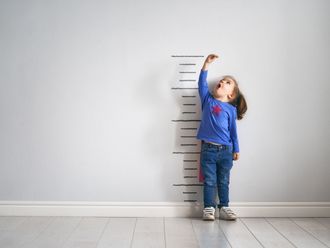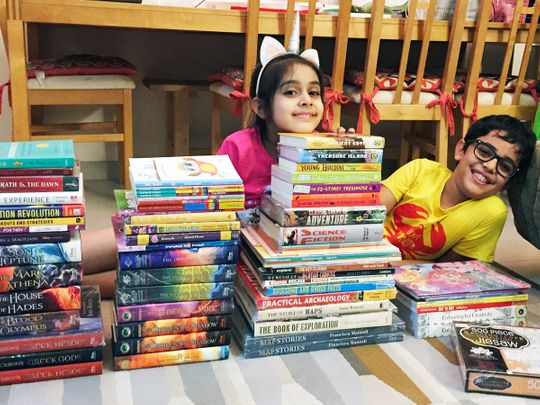
Narayani Basu, an Indian historian and author, recalls how her mother would take her to the local bookstore, as a child. “My mother really loves books, and she always wanted her child to read,” says the Delhi-based 35-year-old, who has a sprawling library in her home. She remembers she used to sit for hours in the local bookstore, with the friendly owner to guide and help her find the books that he knew she would enjoy.
Basu’s drive to become an author can be indirectly attributed to reading in an encouraging environment. Her mother asserted the importance of a child asking questions. “As a reader, that helped – as an author, as a researcher, it helps more and I automatically want to know more about different subjects, and that led to writing a book,” she concludes.
Apart from this, reading is also comfort, a refuge for many, the absorption into another world altogether, away from the distress of reality.
Yashee Singh, echoes these thoughts, and calls books an ‘ever-dependable refuge’. A 32-year-old journalist, working in India, stories have always had a magical sway over her, since childhood. Like Basu, she credits her love for reading to her mother, who began reading to her at the age of three. “I have my mother to thank for introducing me to the power and magic of stories. She would read stories out to me in the afternoon, after lunch.”
I have my mother to thank for introducing me to the power and magic of stories. She would read stories out to me in the afternoon, after lunch.”
It’s a precious memory for Singh, as she recalls those afternoons, which led her to the world of Enid Blyton, abridged classics like Treasure Island and Gulliver’s Travels. “Today, I remain primarily a fiction reader, reading a lot of works by women from different countries,” she says.
On the other hand, 38-year-old Mehr F Husain, a British-Pakistani journalist and author, recalls how books were the main form of entertainment as a child. “This was in the 1980s … the entertainment was catching Sesame Street or cartoons on the VHS. So reading it was, to while away the long days,” she says. Husain, based in Dubai, repeated the same pattern with her two children, aged seven and eleven, as she saw it as a necessity in the advent of the digital age.
Technology has been a blessing - but a chaotic blessing.
Worried about the constant addiction to video games, iPads and mindless net-surfing leading to limited attention spans, many parents have made it a requisite to inculcate reading habits in their children at an early age, almost making it imperative.
Toyin Akanni, a teacher and also a children's author based in Ras Al Khaimah, notes that children are less interested in reading now, as they don't wish to acquire books for research and go through it as a practice.
“As a teacher, I have noticed that my students don’t like long texts as because of social media and videos, so their attention is less.”
All hope isn’t lost, as she says, “Yet, there are children who enjoy books and tune out of the distraction for an extended period of time.”
Her advice to parents facing this problem, is to make books available in the house, so that even as toddlers they would naturally gravitate to them. She also emphasises the importance of a bed-time routine.
“For parents with older children who don’t have the practice established, I would suggest setting aside days of the week, no iPads, or tablets and just read.”
This method of setting aside time for children to read every day, is what many parents have now taken to follow.
As a teacher, I have noticed that my students don’t like long texts as because of social media and videos, so their attention is less. Yet, there are children who enjoy books and tune out of the distraction for an extended period of time.
Fareeha Jalil, a software engineer and a mother of two, based in Dubai, notes how her two kids, aged seven and eleven, spend time reading every day, and how she encourages them to try different genres.
“The goal is that they broaden their minds while enjoying themselves.”
Dubai-based Indian Saranya Rustagi, the head of communications at Heriot-Watt University in Dubai, whose children are aged 13 and 11, didn’t let her children have easy access to devices, during their younger days. And so, the children turned to books “in sheer boredom”, she says.
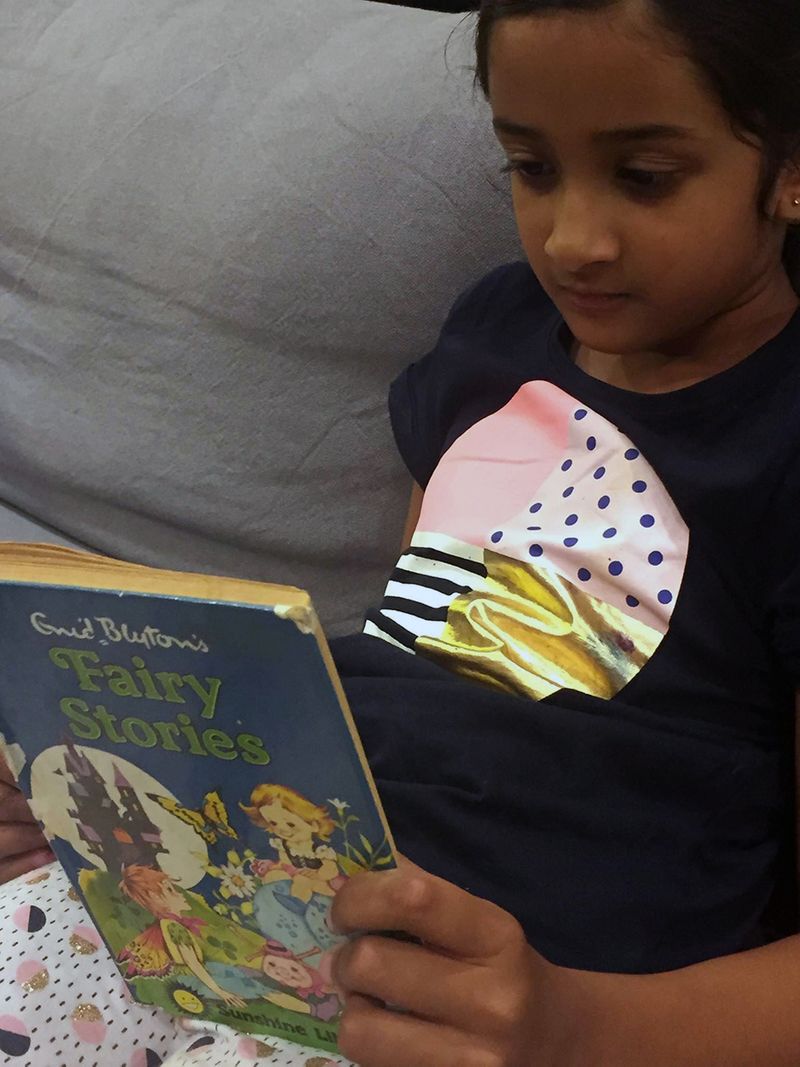
Rustagi was firm on their reading habits, and read to them till they turned nine, and decided to read on their own.
“I took them to libraries as often as I could. I feel all of this really helped inculcate in them the love for reading,” she says.
An avid reader herself, Rustagi, had built a library when her son was four years old, from which he could choose the books he would like to read.
“Oftentimes, when he was not at school or occupied with his toys, he would pick out a book and ask me to read to him. We also have our favourite reading spot. He learnt to spell so that encouraged him to read as well.”
Husain found that reading was time with her children wherein they could be away from the chaos around.
"I have set a rule that every day the children have to read. It's not something they always enjoy, especially when an Ipad and Playstation beckon, but when they realise how relaxed they become and how much they enjoy the achievement of reading a few pages, it makes them appreciate books more and more,” she says. Husain found a way to blend television and reading for her children as they were growing up - she found characters that were of the same characters they saw on screen.
“Thomas the Tank engine, the Mr Men series, the Little Miss Series, Peppa Pig. Once the children found themselves reading about the same characters they were able to 'hear' the characters, which encouraged them to read more,” she notes.
Keeping it fun
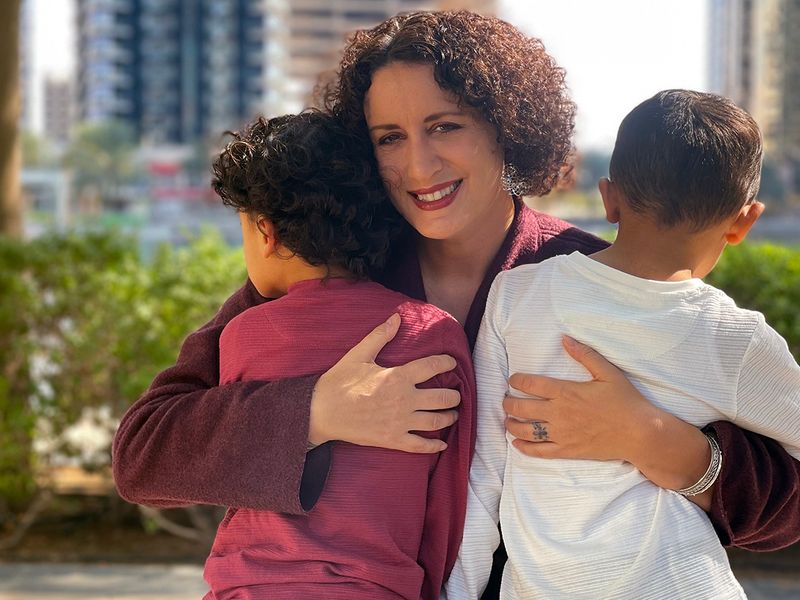
At a rather young age - probably around three or four, when many children are just about learning to read, many parents try and find ways to make bedtime stories fun. Mina Liccione, an American comedian and performing artist, from New York, based in Dubai and mother to five-year-old twins, is one such parent. She enjoys playing out the stories to her children, with her husband.
“My husband and I are both performing artists, so when we read books with them, we go all out with character voices, props and emotions. They associate reading with fun and adventures so that's the foundation we continue to grow upon,” she says. As her children enjoy stories about animals, she researches different animals to learn fun facts about them, so that they enjoy the reading session a lot more.
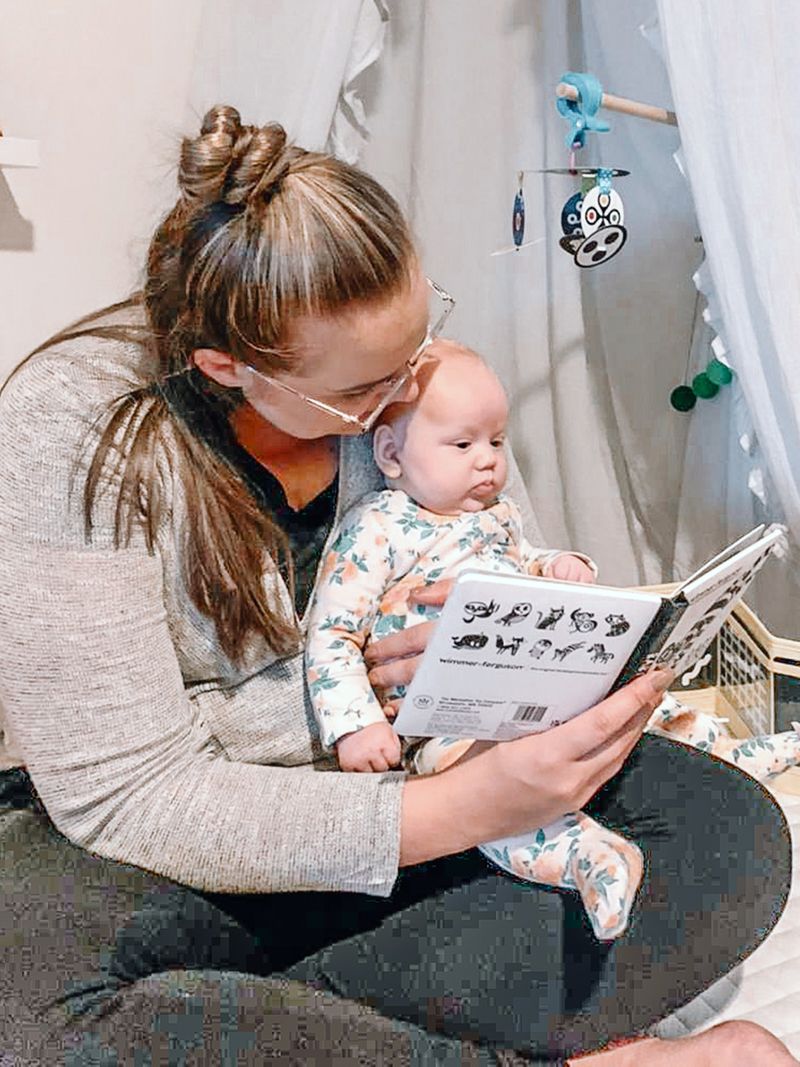
For some families, reading is a family activity. Kathryn Kelly, a British mother of two children, aged three and a one-and-a-half year old, based in Dubai, says she uses reading as a “valuable tool” for different occasions, like regulating emotions, and teaching them lessons on women empowerment.
“There’s a story for everything. I definitely encourage them to try different genres, and we have a subscription that helps with amazing topics and new authors,” she says. Kelly mentions that she brought the world of books to her children, right after they were born, showing them black, white, red sensory images and then moved them to real-life picture books.

I have set a rule that every day the children have to read. It's not something they always enjoy, especially when an Ipad and Playstation beckon, but when they realise how relaxed they become and how much they enjoy the achievement of reading a few pages, it makes them appreciate books more and more.
While library trips, reading them to bedtime have proved to be instructive, Priyanka Wade, an Indian business development director with a sales representation company in Dubai, has found different ways to encourage her 12-year-old daughter to read.
“Children are exposed to technology way earlier, so encouraging them to read the old-fashioned way is far more challenging,” she admits. “My daughter is an active member of the Dubai Gavel club (Toastmasters version for Kids 10-18)." This is fruitful as her daughter researches and reads more for her subjects on public speaking, sparking interest and curiosity. In addition, she has also participated in illustration, reading and writing workshops, which has furthered her love for reading.

Children are exposed to technology way earlier, so encouraging them to read the old-fashioned way is far more challenging.
Reading and mindfulness
Mindfulness coach Sandy Zanella, a Mexican-American, based in Dubai, who recently published the book Happy Yogis, a book that helps kids cultivate a mindfulness practice, says: “When parents read books with their children, they create a unique bonding experience where the child feels connected, safe, and happy. This creates a powerful impact on a child’s mental health. When a child reads a book, this can become a mindfulness practice.
“Kids can focus on reading while enjoying being present in the moment and taking their mind off of stressful thoughts and anxiety. Reading also can give children better communication skills, increase their confidence, and improve their self-regulation skills.”
She also gives the examples of several books that parents could use that would benefit their children’s mental health, including ‘mirror’ books that see children going through similar challenges with characters they relate to, and ‘window’ books that help them understand people living lives different from their own. This also contributes to building empathy, says Zanella.
Starting early is key for benefits to last

Kids can focus on reading while enjoying being present in the moment and taking their mind off of stressful thoughts and anxiety. Reading also can give children better communication skills, increase their confidence, and improve their self-regulation skills.
Many parents agree that healthy reading habits should be inculcated in the early days of childhood for the positive effects to play out well. Mehr Husain observes how her children concentrate when reading, "I have seen how they relax, and their emotional and mental state is gentler."
Drawing from her own experience, Saranya Rustagi says that reading strengthened her vocabulary and gave her a different perspective. "Children who read gain a better understanding of abstract concepts, and develop comprehension skills and excellent writing skills," she adds.
Like Jhumpa Lahiri wrote in her book, The Namesake, that’s the thing about books, you can travel without ever moving your feet. For some, it’s travel, a learning experience - a desire to know more. For others, it's a comforting space, hidden between words and pages.



